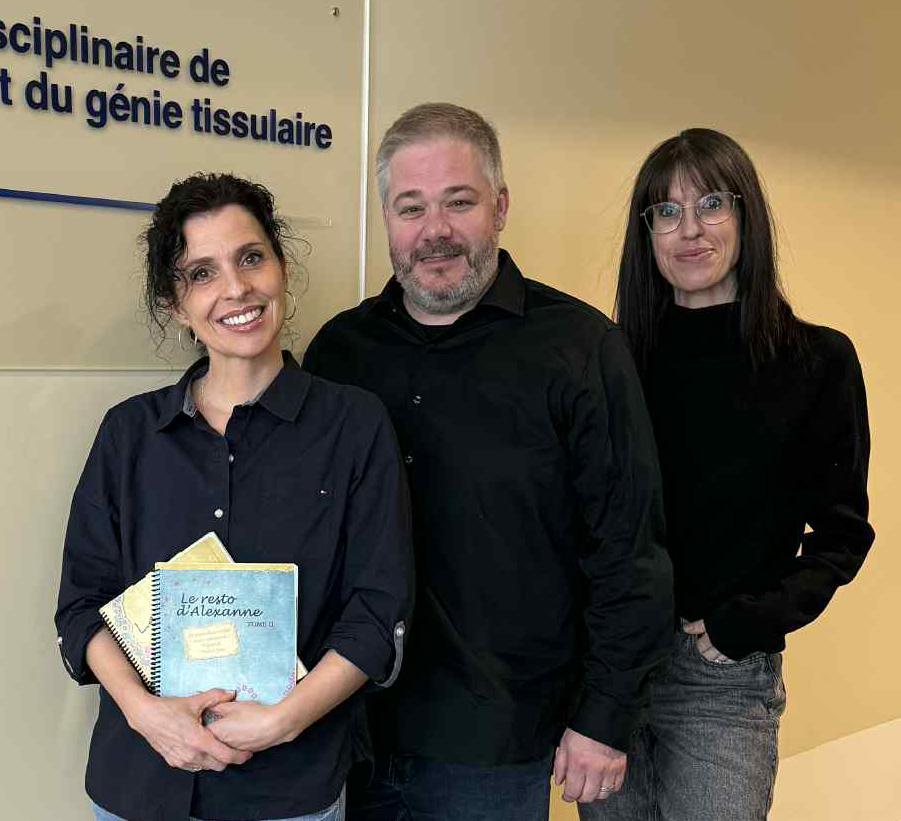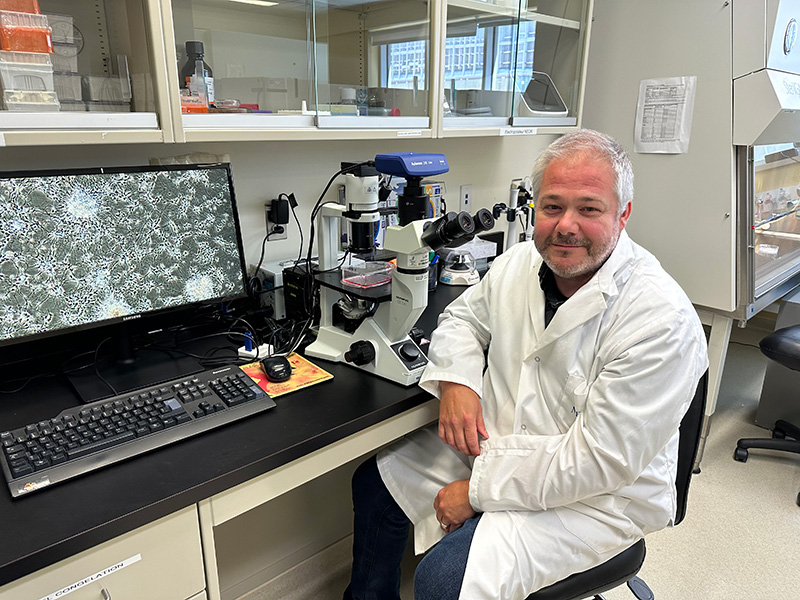How a cookbook influenced Dr. François Gros-Louis's research
Researcher and patient-led-groups working together

Martine Delisle with the recipe books "Les Restos D'Alexanne", Dr François Gros-Louis, and Gabrielle Labonté, General Manager of ANFQ.
Dr. François Gros-Louis is a researcher and professor at Université Laval who is currently researching Neurofibromatosis Type 1, (NF1). NF1 is a genetic condition that is triggered by a change (mutation) in a gene called NF1, which causes tumors to grow on nerves throughout the body. The tumors are usually non-cancerous, but they can still cause serious health problems depending on where they grow.
NF1 affects about 1 in 3,000 individuals, with no difference, to date, in the prevalence reported between males and females. Individuals with NF1 generally develop small tumors that appear on the surface of the skin, called cutaneous neurofibromas. There is no way to predict the location or the number of cutaneous neurofibromas a patient will develop. These visible tumors often lead to psychological distress such as anxiety, lowered self-esteem, depression and social isolation.
Dr. Gros-Louis and his lab are looking to uncover the underlying disease mechanisms and the biological processes that drive tumor formation and progression in individuals affected by NF1.
Research
To understand how these tumors form and grow, Dr. Gros-Louis's laboratory is creating disease models using pluripotent stem cells (iPSCsFootnote *) derived from NF1 patients. These special cells can be cultured and turned into nerve cells or other relevant cell types affected in NF1 patients. "This approach allows us to explore, in a controlled way, how the NF1 mutation alters cell behavior," explained Dr. Gros-Louis.
Part of his research focuses on exosomes which "are tiny bubble-like particles released by cells," that carry information in different forms that can be transferred from one cell to another or to the surrounding microenvironment. Dr. Gros-Louis described that exosomes act "as the body's natural messaging system, helping cells communicate and influence each other’s behavior."
They are interested in how cells from NF1 patients produce and release exosomes, in hopes of discovering new biomarkers (measurable signs of disease) and identifying new targets for therapy. Dr. Gros-Louis explained, by using this knowledge, it may "lead to better tools for diagnosis, monitoring disease progression, predicting disease severity, or even stopping tumors from growing in the first place."
Why the focus on NF1
Shortly after starting at the Centre Hospitalier Universitaire (CHU) de Québec, Université Laval, Dr. Gros-Louis had a conversation with Martine Delisle, who at the time worked at the hospital and had a young child living with NF1. She shared her family's story and her deep desire to raise awareness about the disease and stimulate more research.
Ms. Delisle created and sold a cookbook in her daughter's name to raise money that enabled Dr. Gros-Louis to launch a small pilot project focusing on NF1 in his laboratory. This early support gave him the opportunity to generate preliminary data, which ultimately helped him secure a CIHR research grant and solidify his focus on NF1.
Dr. Gros-Louis Involvement in Patient-led Groups
Véronique Maheux, president of The Association de la neurofibromatose du Québec (ANFQ), explained that creating relationships between researchers and patient/patient-led organizations is beneficial for all those involved. She also mentioned that, "It helps promote research in areas that are priority issues for Neurofibromatosis patients, as well as making research more concrete for them. We also have had the opportunity to visit research laboratories, meet future graduates in the field and emphasize the importance of our association to motivate researchers to undertake NF work or maintain existing efforts".
Ms. Maheux expressed, "Dr. Gros‑Louis organizes conferences for our members to show them the progress made in his research. He also encourages a better understanding of the disease and is a significant driver of hope in our community."
What's next

Dr. Gros-Louis and his laboratory will continue to focus on deepening their understanding of the cellular mechanisms that drive tumor formation in people affected by NF1, with the goal to identify new therapeutic strategies that go beyond managing NF1 symptoms.
Dr. Gros-Louis shared that they "have established strong foundations", which support various research projects, including those focused on fundamental science of NF1 and creating a NF1 patient registry. His laboratory is also involved in research projects looking at other neurodegenerative diseases.
"We do not simply study the brain—we build pathways to heal it. In the fusion of biology and engineering lies the future of hope for those with no cure today."
For more information
- François Gros-Louis - Centre de recherche du CHU de Québec-Université Laval
- The Association de la neurofibromatose du Québec (ANFQ)
References
- Moodley et al., 2024 DOI: 10.1016/j.spen.2024.101172
- Haynes et al. 2011 DOI: 10.1080/19371918.2011.579498
- Date modified: